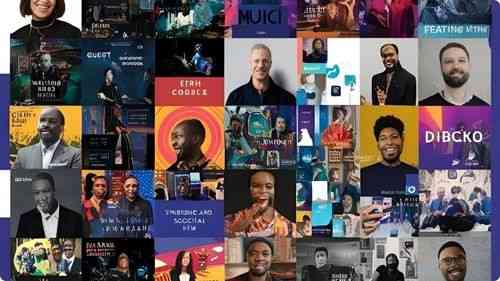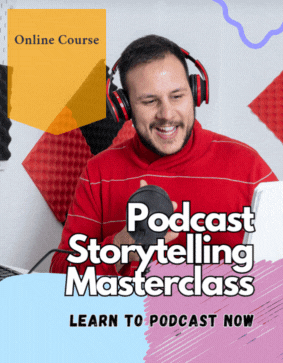Don't Start a Podcast Until You Do This
12,398 View
Share this Video
- Publish Date:
- May 17, 2025
- Category:
- Podcasting
- Video License
- Standard License
- Imported From:
- Youtube
Tags
Try this trick as you're starting your podcast, brainstorming episodes or coming up with a podcast idea #podcasting #podcaster #podcastlife #podcasters #shorts
-----------------------------------------
How to Start a Podcast - Podcasting Made Easy
Podcasting Made Easy is your ultimate guide to launching a successful show—fast, fun, and with zero overwhelm. Taught by podcast pioneer Scott Paton, this bestselling course walks you through setup, hosting, publishing, and growth strategies. With over 32,000 students, you’ll learn how to use tools like Libsyn, reach Spotify and Google Podcasts, and even build a podcasting business. Whether you're brand new or ready to scale, Power Podcasting helps you grow influence, relationships, and revenue—all while whispering directly into the ears of your ideal audience. Ready to get your voice heard and change lives?
3 Must-Know Podcasting Tips for Your Show
Building a Strong Podcast Brand Identity

A strong brand identity distinguishes your podcast in a crowded market and fosters loyalty among listeners. Define your podcast’s unique value proposition by identifying what sets it apart from others in the same genre. Develop a recognizable logo and consistent color scheme that reflects your podcast’s personality and theme. Craft a compelling tagline that succinctly conveys your podcast’s mission and appeal. Maintain consistency in your communication style, tone, and visual elements across all platforms, including your website and social media profiles. A cohesive brand identity not only attracts your target audience but also makes your podcast memorable and professional, encouraging long-term growth.
Developing a Unique Voice and Style

Establishing a unique voice and style sets your podcast apart and makes it memorable to listeners. Define your podcast’s personality by determining the tone, whether it’s conversational, formal, humorous, or inspiring. Be authentic in your delivery, allowing your genuine personality to shine through and connect with your audience. Develop consistent formatting, including how you introduce topics, transition between segments, and sign off each episode. Incorporate distinctive elements such as catchphrases, specific storytelling techniques, or unique soundscapes that reflect your podcast’s identity. A strong and consistent voice fosters recognition and loyalty, encouraging listeners to return and recommend your podcast to others.
Leveraging Guest Appearances to Grow Your Audience

Featuring guests on your podcast can significantly expand your reach and attract new listeners. Select guests who are experts in your niche or have a substantial following that aligns with your target audience. Prepare thoughtful questions that allow your guests to share valuable insights and experiences, providing rich content for your listeners. Promote episodes with notable guests across both your and your guests’ networks, tapping into their audience base. Encourage guests to share the episode with their followers, increasing your podcast’s visibility. Collaborative episodes not only enhance the quality of your content but also foster relationships within your industry, contributing to your podcast’s growth and credibility.
Frequently Asked Questions
How long should a typical podcast episode be?
Episode length can vary, but typically ranges from 20 to 60 minutes. Choose a duration that suits your content and keeps your audience engaged without overwhelming them.
How can I create engaging podcast content?
Focus on topics you are passionate about, research thoroughly, and structure your episodes with a clear introduction, main content, and conclusion. Engaging storytelling and relevant information keep listeners interested.
How do I handle technical issues during a podcast recording?
Have a backup plan, such as secondary recording software or equipment, regularly update your technology, and troubleshoot common problems in advance to minimize disruptions during recording.
What is the role of a podcast publisher?
A podcast publisher manages the dissemination of your episodes to various platforms, handles distribution logistics, and often provides tools for analytics and monetization to support your show’s growth.
What should I include in my podcast's intro and outro?
Your intro should introduce the podcast and set the tone, while the outro can include a summary, thank you message, and a call to action, such as subscribing or following on social media.
How can I make my podcast stand out in a crowded market?
Develop a unique voice, focus on a specific niche, deliver consistent quality, and engage authentically with your audience. Creative content and distinct branding also help differentiate your podcast.
Statistics
- Podcasts that offer unique and niche content are 35% more likely to build a dedicated listener base.
- Engaging storytelling techniques can increase listener retention rates by up to 50%.
- Over 80% of podcasters report that having a dedicated website enhances their show’s visibility.
- Podcasts utilizing video snippets on social media experience a 20% rise in audience interaction.
- Genres such as true crime, technology, and personal development are among the most popular, attracting over 70% of listeners.
- About 60% of podcasters find that offering premium content subscriptions generates additional revenue.
- Listeners are 50% more likely to subscribe to podcasts that offer regular episode releases.
- Approximately 70% of successful podcasters invest in high-quality microphones to ensure clear audio.
- Podcasts that engage with their audience through email newsletters see a 30% higher retention rate.
- Effective use of keywords in podcast descriptions can improve search rankings by 30%.
- Podcasts with eye-catching cover art are 45% more likely to attract new listeners.
- Podcasts that regularly update their equipment report a 40% improvement in audio quality and listener satisfaction.
- On average, podcasters spend about 10 hours per episode from planning to publishing.
- Listeners prefer podcast episodes that range between 30 to 45 minutes, with 65% favoring this duration.
- Investing in professional editing services can enhance the overall quality of a podcast, leading to a 30% increase in positive feedback.
- About 55% of podcasters use interviews as a key strategy to provide diverse content.
External Links
analytics.google.com
blog.podomatic.com
podcastgrandcentral.com
screencast-o-matic.com
audacityteam.org
transistor.fm
help.apple.com
zoom.us
podcasters.spotify.com
inc.com
podbean.com
mailchimp.com
shutterstock.com
podcastitalia.com
thepodcasthost.com
podcastpage.io
canva.com
How To
How To Create a Podcast Advertising Strategy
Creating a podcast advertising strategy ensures you effectively reach and engage your target audience while maximizing your marketing efforts. Begin by defining your advertising goals, such as increasing listener numbers, promoting a specific episode, or driving traffic to your website. Identify your target audience’s demographics, interests, and preferred media channels to tailor your advertising approach. Develop a mix of advertising tactics, including social media ads, search engine marketing, and collaborations with influencers or other podcasters. Create compelling ad creatives that highlight your podcast’s unique value proposition and include clear calls to action. Allocate your budget based on the effectiveness of each advertising channel and monitor the performance of your campaigns using analytics tools. Adjust your strategy as needed to optimize results and ensure your advertising efforts contribute to the growth and success of your podcast.















